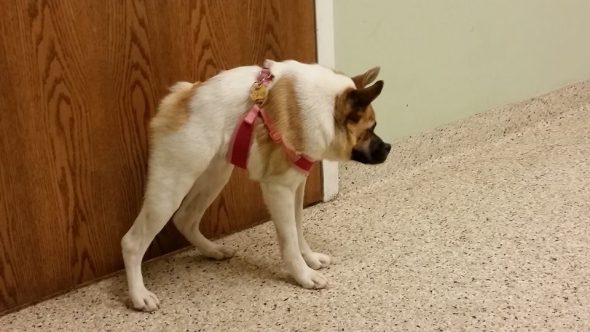Cuda’s family adopted her at five months, not knowing what was “wrong” with her. It turned out: nothing, really! Cuda was born with short spine syndrome, a condition caused by inbreeding. Aside from having a little difficulty scratching her butt, she’s just like any other dog! (Note to the concerned: her family makes sure she gets plenty of butt scratches!).
Owner Julie LeRoy, a former animal control officer, says that Cuda’s former owner bought her off Craigslist for $50.
She runs – fast! She plays. She loves her human and canine family members. She was even certified as a therapy dog, so she brings lots of love and sweetness to many people outside her own circle. Her mom thinks Cuda helps people become comfortable in their own skin — and she is so grateful that she gets to have a dog so special.
What is short spine syndrome?
Short spine syndrome is a defect dogs have from birth. The vertebrae are compressed, creating a severe shortening of the spinal column, and giving dogs a short, hunch back look.
Often the some of the vertebrae are even fused together, which means dogs born with this condition are often less flexible than other pups (resulting in circumstances like Cuda’s, wherein she has trouble scratching her rear end!). One of the signature features of dogs with short spine syndrome is a neck-less appearance. As the vertebrae is fused, they generally cannot turn their heads and instead must pivot around completely to see things that are behind them. These dogs have “normal-looking legs,” but short, barrel-shaped bodies. Many have fewer ribs than the average dog.
While rare, dogs with short spine syndrome have been getting greater visibility of late. Cuda is just one of the poster children for the condition. Others include Pig, the Unusual Dog…

…and Quasimodo!

The condition is so rare that only a handful of dogs in the world, numbering somewhere in the teens, are known to have the condition.
